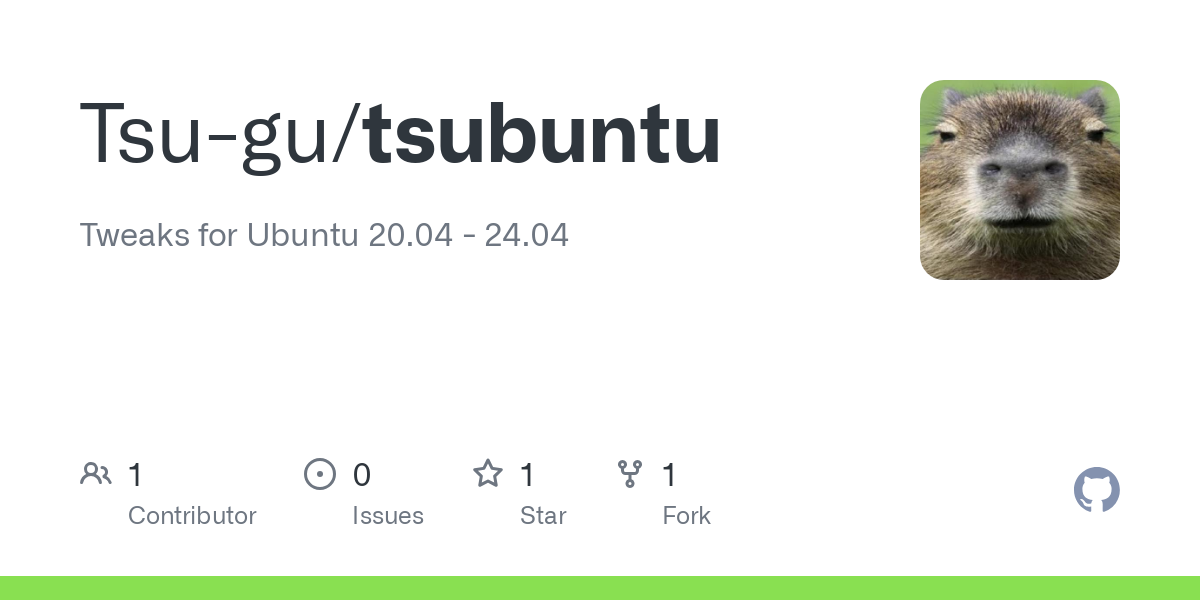I made a script that configures Ubuntu (mainly its GNOME) the way I like it. I also made it work in Debian and Fedora.
(github.com)
from tsugu@slrpnk.net to linux@lemmy.ml on 29 Sep 2024 17:38
https://slrpnk.net/post/13796692
from tsugu@slrpnk.net to linux@lemmy.ml on 29 Sep 2024 17:38
https://slrpnk.net/post/13796692
It doesn’t do any crazy ricing, as I mostly focused on usability tweaks and automatic installation of my must-have extensions. (Tiling, clipboard manager, dash to dock, desktop icons)
Most notable tweaks include:
- clicking on a running app minimizes it
- clicking on a group of apps brings up their previews
- adds minimize, maximize buttons to windows
- installs flatpak, adds flathub
- install flatpak and snap plugins into gnome-software (doesn’t work on Fedora)
- installs snap
- installs mtp-tools and gvfs-backends on Debian to be able to transfer files from a connected phone
- adds right click > New File
- Super + Shift + S brings up the area screenshot
- Super + E opens the file manager
- Ctrl + Alt + T opens the terminal
(Those already configured on Ubuntu don’t get configured again, obviously.)
I also recorded a short showcase to prove that it works without errors youtu.be/xf739ivb9hg

threaded - newest
inb4 snap bad, they are bash scripts. Anyone can delete any command they don’t like.
On Ubuntu, do you also remove the Snap store and install gnome-software?
Do you add the PPAs for updated flatpak version and dependencies like bubblewrap?
Nope, I don’t touch the snap-store on Ubuntus (to be fair I don’t install any snap plugins for gnome software center on Debian/Fedora either). As for flatpak, it’s installed via apt from the regular repos. I didn’t even know there was an up to date PPA.
I know about this but that’s meant for 18.04 and earlier.
Edit: these are good suggestions tho. Something to work on to improve it even more.
I am not sure what distros those PPAs are for, may really just be for old versions.
I added
sudo apt install gnome-software-plugin-snap gnome-software-plugin-flatpak gnome-softwareLooks like Fedora does not havegnome-software-plugin-snaporgnome-software-plugin-flatpakin its repos.On Fedora is is likely just named differently ;) it for sure has at least Flatpak support.
Background is that flatpak is used directly, not through packagekit.
Have a look at packages.fedoraproject.org
I checked and Fedora dropped support for the snap plugin. discussion.fedoraproject.org/t/…/76134
These are also the only packages related to gnome-software:
Related Packages gnome-software-devel gnome-software-fedora-langpacks gnome-software-rpm-ostreeFrom what I remember, their gnome-software already has flatpak support. So all that will be missing is the GUI snap support. Could’ve been worse.
Interesting, thanks for the research!
Snaps are unsandboxed on Systems without AppArmor so they are not a useful cross platform technology anyways.
Yeah, that sucks. I would still want it if I were to use Fedora, as an option.
Yup but people dont care to maintain it. It was barely maintained for a longer time
I don’t mean to be that guy, but if you like your desktop a certain way and want to easily configure it you might want to look into Nix and home-manager, it’s difficult to get started but once you have a config that works it lets you set up your whole OS and desktop and lots of apps.
I don’t wish to learn Nix. I’m perfectly fine with Debian/Ubuntu/Fedora. When a new version comes out, all I have to do is change the versions of the extensions according to the new Gnome version.
Not that it would eliminate every shell command but you should learn Ansible. This is what’s it’s built for.
I was recommended this flathub.org/…/io.github.vikdevelop.SaveDesktop Seems very user friendly and can do everything except for installing software.
Interesting project. Thanks for the share. Just saying Ansible is a more “general purpose” tool, almost a programming language, to configure most anything, not just desktop environments.